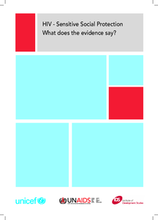Over the past decade, there has been growing recognition of the importance of social protection to respond to a range of challenges faced by developing countries, including food insecurity, chronic poverty and the HIV pandemic. HIV and AIDS can push people and households into poverty, in part by reducing household labour capacity and increasing medical expenses. In some cases, HIV-related stigma and discrimination marginalizes people living with HIV and households affected by the virus, and excludes them from essential services. Despite increased access to life-saving treatment, HIV and AIDS can increase individual and household vulnerabilities, hampering governments’ efforts to meet the Millennium Development Goals. In the face of rising HIV prevalence rates and the aftershocks of the recent economic crisis, few developing countries outside Latin America have national social protection systems or large-scale coverage. Social protection systems are especially limited in sub-Saharan Africa, with the notable exception of a few Southern African countries. While many social protection schemes were not set up with HIV as a primary focus, their potential to contribute to a comprehensive HIV response is increasingly recognized. The UNAIDS business case on social protection, which was a catalyst for the development of this paper, shows how HIV-sensitive social protection can reduce vulnerability to HIV infection, improve and extend the lives of people living with HIV, and support individuals and households. While not specific to children, the paper includes sections on HIV and Child Protection and HIV and Early Childhood Development.

